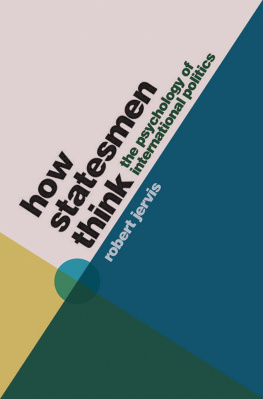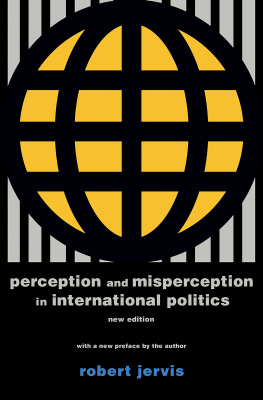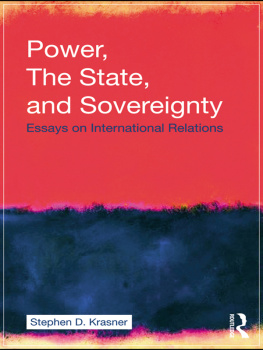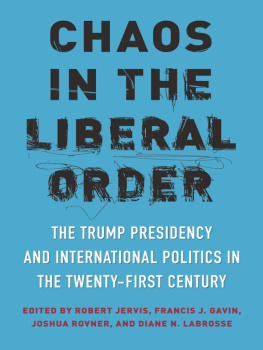
HOW STATESMEN THINK
How Statesmen Think
The Psychology of International Politics
Robert Jervis
PRINCETON UNIVERSITY PRESS
PRINCETON AND OXFORD
Copyright 2017 by Princeton University Press
Published by Princeton University Press,
41 William Street, Princeton, New Jersey 08540
In the United Kingdom: Princeton University Press,
6 Oxford Street, Woodstock, Oxfordshire OX20 1TR
press.princeton.edu
All Rights Reserved
ISBN 978-0-691-17505-8
ISBN (pbk.) 978-0-691-17644-4
British Library Cataloging-in-Publication Data is available
This book has been composed in Adobe Text Pro and Gotham
Printed on acid-free paper.
Printed in the United States of America
10 9 8 7 6 5 4 3 2 1
For Kathe, 50 years and still going strong
CONTENTS
ACKNOWLEDGMENTS
Many authors have said that they have too many debts to fully acknowledge. Since the chapters of this book were originally published as separate essays, this is truly the case here. So at the risk of offending friends and colleagues, let me just thank the members and staff of the Arnold A. Saltzman Institute of War and Peace Studies and especially its administrator, Ingrid Gerstmann, for providing a marvelous environment in which to work and for putting up with seemingly endless requests for assistance. The errors they did not catch are mine alone.

These articles originally appeared in the sources listed below. Permission from the publishers to reprint them is gratefully acknowledged.
1. Understanding Beliefs, Political Psychology 27 (October 2006): 64163. Republished by permission of John Wiley & Sons.
2. The Drunkards Search, in Shanto Iyengar and William McGuire, eds., Explorations in Political Psychology (Durham: Duke University Press, 1993), pp. 33860. All rights reserved. Republished by permission of the publisher.
3. Representativeness in Foreign Policy Judgments, Political Psychology 7 (September 1986): 483505. Republished by permission of John Wiley & Sons.
4. Political Implications of Loss Aversion, Political Psychology 13, Special Issue: Prospect Theory and Political Psychology (June 1992): 187204. Republished by permission of John Wiley & Sons.
5. Signaling and Perception: Drawing Inferences and Projecting Images in Kristen Renwick Monroe, ed., Political Psychology (Mahwah, N.J.: Lawrence Erlbaum, 2002), pp. 293313. Reproduced by permission of Taylor and Francis Group, LLC, a division of Informa PLC.
6. Bridges, Barriers, and Gaps: Research and Policy, Political Psychology 29 (August 2008): 57192. Republished by permission of John Wiley & Sons.
7. Why Intelligence and Policymakers Clash, Political Science Quarterly 125 (Summer 2010): 185204. Reprinted by permission of the Academy of Political Science.
8. Identity and the Cold War, in Melvyn Leffler and Odd Arne Westad, eds., The Cambridge History of the Cold War, vol. II, (Cambridge: Cambridge University Press, 2010), pp. 2243. Republished by permission of Cambridge University Press.
9. Deterrence and Perception, International Security 7 (Winter 198283): 330. Republished by permission of MIT Press.
10. Psychology and Crisis Stability, in Andrew Goldberg, Debra Van Opstal, and James Barkley, eds., Avoiding the Brink (London: Brasseys (UK) Ltd., 1990), pp. 1742.
11. Domino Beliefs and Strategic Behavior in Robert Jervis and Jack Snyder, eds., Dominoes and Bandwagons: Strategic Beliefs and Great Power Competition in the Eurasian Rimland (New York: Oxford University Press, 1991), pp. 2036. Republished by permission of Oxford University Press.
12. Perception, Misperception, and the End of the Cold War in William C. Wohlforth, ed., Witnesses to the End of the Cold War (Baltimore: The Johns Hopkins University Press, 1996), pp. 22039. 1996 The Johns Hopkins University Press. Reprinted with permission of Johns Hopkins University Press.
HOW STATESMEN THINK
Introduction
Just as my path to writing Perception and Misperception in International Politicspsychology seemed to hold out the possibility for combining if not reconciling these conflicting impulses.
In the preface to the new edition to Perception and Misperception I have outlined what I see as the main developments in the field over the past forty years. Many of them are represented in the essays here, and before introducing them I just want to note a few things about the field.
As a perusal of the main journal in the field, Political Psychology, indicates, the focus of most of my colleagues has been on attitudes and voting behavior. Of course there is some overlap between this and my concerns with international politics and leaders decisions and perceptions, but not only are the individuals involved quite different, but also politics and political choices are much more important to the people I study than they are to the general public. Nevertheless, all of them are human beings faced with a surfeit of information and multiple pressures. So I think that despite many differences, most forms of political psychology share five distinguishing characteristics.
First is the belief that to understand human behavior we have to examine how people think, interpret their environments, and reach decisions. Simple stimulus-response models rarely will do. There are a large variety of stimuli to which people can respond, and they often are quite ambiguous. To turn to international politics, theories that stress the importance of the states external environment, although extremely useful for some purposes, leave many central questions unanswered. Even when we find common patterns of behavior, are deeply contested, and knowing only the external situation does not tell us why different individuals came to different conclusions, let alone who prevailed. We need to look inside the black box of the state to study the goals, beliefs, and perceptions of the decision-makers.
A related way of putting this is to note that standard notions of rationality are not so much incorrect as insufficient to catch either the objectives toward which people strive or the means by which they try to reach them. This does not mean, however, that the perspectives of political psychology and rational choice theory are entirely antithetical. The form of rational choice that is most appropriate to the study of international politics is game theory, which revolves around actors anticipations of others behavior and of others anticipation of their behavior. Game theory cannot put flesh on this skeleton, however, because it cannot speak to how these expectations are formed and what they will be. Political psychology is essential here.
A good deal of the field examines deviations from rationality. In many instances this may not be useful, however, partly because the very notion of rationality may be indeterminate or contested. Indeed, a focus on rationality, or the lack thereof, can lead us into two traps. First, it inclines us to giving points or demerits to the decision-makers in a way that may obscure understanding. Second, we may too easily infer the rationality of decisions from the quality of the outcomes. While we might want to think that greater individual rationality and better decision-making processes lead to better policies, we should not assume that this is the case and, even if the generalization is correct, there are sure to be multiple exceptions.
A second component of political psychology is the search not only for common patterns, but for generalizations that apply only to some groups and that separate them from others, and also for individual idiosyncrasies. Much of the discussion in the subsequent chapters, like a great deal of the field, looks for patterns that, if not universal, are at least widespread. But there is a tension here between such a search and the realization that individual and group differences are important. We must be careful not to overgeneralize from Western experience or experimental subjects.culture, people differ in the ways they process information, draw inferences, and reach decisions. Furthermore, since international politics is interactive, we must also come to grips with the fact that political leaders are less prone than scholars to homogenize people and that they devote serious attention to trying to understand the goals and perceptions of those with whom they are dealing.
Next page














